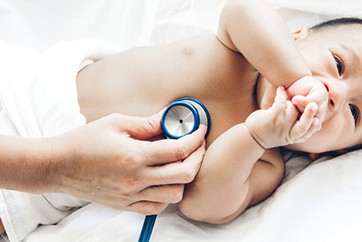With autumn approaching, there are a few things we know we can expect – leaves changing colors, pumpkin-spiced lattes, Halloween candy, and a likely uptick of respiratory infections, specifically Respiratory Syncytial Virus (RSV).
This year, Alzein Pediatrics has seen cases of RSV much earlier than usual, and often more severe than usual. RSV can be very scary for both children and their parents, so we are here to help you understand this virus and ways to treat and prevent it.
What is RSV?
RSV is an infection of the lungs and respiratory tract. It is so common that most children have been infected with the virus by age 2 and it can also infect adults and older children.
RSV is not new – and you should assume that you’ve had it yourself at some point in time. However, you’re likely hearing more about RSV news now because of complications related to COVID-19.
Having RSV lowers your child’s immunity and increases their risk of getting COVID-19. RSV weakens and damages your child’s lungs, and then COVID-19 weakens and damages them even more.
What are the symptoms of RSV?
RSV typically resembles a cold with congestion, dry cough, low-grade fever, sore throat, sneezing, and a headache. In more severe cases, RSV develops into pneumonia or bronchiolitis, which includes additional symptoms of fever, severe cough, wheezing, and rapid and difficult breathing.
Even though RSV is common, it becomes extremely dangerous in children with these factors:
- Premature infants, as their lungs are underdeveloped
- Infants under 6 months of age
- Infants born with heart or lung disease
- Children with weakened immune systems, including those who have received an organ transplant or those undergoing chemotherapy
- Children who have difficulty swallowing or can’t clear mucously
How is RSV treated?
In most cases, RSV can be treated at home, and children and adults will recover in one to two weeks. At home, make sure your child is getting plenty of rest and liquids. To ease breathing, make sure the air is moist by using a cool mist humidifier.
However, even a mild to moderate case of RSV can be dangerous, especially for young children and older adults. When treating a mild case at home, watch for signs of dehydration, such as decreased urination, including dry diapers or no need to use the bathroom for older children, sunken eyes, and extreme fatigue. If your child is unable to stay hydrated, they may need an IV to replenish fluids in the hospital.
In severe cases, when your child is experienced labored breathing or their chest heaving to catch a breath, call us or visit Urgent Care immediately. We will ensure the RSV develops into pneumonia or bronchiolitis. If needed, your Alzein Pediatrics medical professional may suggest a hospital stay that will include monitoring, IVs to replenish fluids, humidified oxygen, or other interventions.
When to Call Alzein Pediatrics for RSV Problem
Whenever your child has labored breathing, spikes a high fever, has difficulty breathing, or starts to turn blue around the lips or nails, get to an emergency room immediately.
How do I prevent RSV in Chicago Based Children?
RSV is, and always has been, easily transferable. However, steps to prevent RSV are likely already in place in your home as we are now more aware of infection spread prevention. Limit the spread of RSV and other viruses and bacteria by:
- Washing hands frequently
- Avoiding exposure to people who are ill
- Cleaning surfaces regularly
- Not sharing anything that goes directly into your mouths, such as forks, glasses, lip balm, and more
- Washing toys regularly
- Eliminating smoking and NEVER allowing smoke around children. Tobacco smoke increases the risk of RSV in children.
With proper prevention and prompt treatment, RSV can be just a mild childhood illness in your family.
Questions about RSV or your child’s overall health? Call Alzein Pediatrics at 708-424-7600 or click here to make an appointment at our evergreen park, oak lawn, or urgent care locations.


